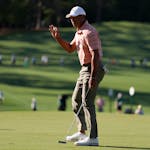 See
more of the story
See
more of the story
The Twin Cities welcomed back the PGA Tour on Thursday after a long time away from a state that has a deep history with professional golf.
Yes, the Twin Cities have long been home to amazing tournaments and players, and that doesn't just include events like the recent Ryder Cup and PGA Championships held at Hazeltine.
Jack Nicklaus made his name as an amateur at the Trans-Mississippi, in which he won back-to-back championships, including one held at Woodhill Country Club in Wayzata in 1959. He had won the tournament the year before, as well.
The headline in the Star Tribune read: "Nicklaus Downs Beman for Trans Crown." Nicklaus defeated Deane Beman 3 and 2 in the final.
The fact that Nicklaus had won the Trans-Mississippi was a big deal because, as an amateur, it helped him qualify for the U.S. Open.
Incredibly, Nicklaus went on to the 1960 U.S. Open at Cherry Hills Country Club in Colorado and finished as runner-up to Arnold Palmer. His score was the lowest for an amateur in tournament history, 2-under-par 282. He finished two shots behind Palmer, and Ben Hogan finished two shots behind Nicklaus.
When he won the Trans-Mississippi in Minnesota, Nicklaus was just 19 years old and still playing for Ohio State. A year later, he competed in Minnesota in the Big Ten Championship, the same year he finished second at the U.S. Open.
Keller started it all
The first golf course in the state to really make a name for itself was the Keller Golf Course in Maplewood.
Keller hosted the 1932 PGA Championship, the 1949 Western Open and the 1954 PGA Championship.
On top of that it hosted the St. Paul Open from 1930-42, then took some years off for World War II before hosting it again from 1945-66.
Keller also hosted the Patty Berg Classic, an LPGA event, from 1973-80.
Maybe the most famous champion at Keller was Sam Snead, who won the St. Paul Open in 1937 and came back to win the 1949 Western Open.
At that Western Open, the tournament allowed Ray Vennewitz, known at the time as the king of the caddies, to pick a player he wanted to caddie for because he had sold 60 season tickets to the course.
He picked Jimmy Demaret, who had won the 1948 St. Paul Open.
Vennewitz told me: "Demaret is just a terrific guy. And what a man to caddie for. He never beefs. He proved he could beat this course last year and he will do it again."
But Snead absolutely dominated for the victory in front of huge crowds. He shot 20 under par, a tournament record.
He told me after the win that a putter given to him by Stan Kertes, a Chicago golf pro, had made all the difference.
"Kertes gave me that putter in Phoenix a few months ago, and I have won five tournaments since," said Snead, who had a reputation as a lousy putter. "I started off winning the Greensboro Open with it and have been lucky since. It certainly helped me on short putts."
Cherry Hills Open
One of the biggest tournaments in golf that I covered didn't take place in Minnesota. It was the U.S. Open in 1978 at Cherry Hills in Colorado.
Two reporters covered the event for the Star Tribune, including Jon Roe, who was the newspaper's golf reporter.
Surprisingly, the major was won by Andy North, from Madison, Wis. I talked to him in the clubhouse after the victory and he told me that he was really excited about new Badgers football coach Dave McClain and then talked about how some of his favorite teams were the Badgers, Packers and Brewers.
North was just 28 years old. He won only three tournaments in a long PGA Tour career, but two of them were U.S. Opens, the first in '78 and again in 1985.
At Cherry Hills he held off J.C. Snead, Dave Stockton, Hale Irwin and Tom Weiskopf and he also dealt with Jack Nicklaus, Johnny Miller, Gary Player and Tom Watson finishing in the top 10.
North held a five-stroke lead during the final round but won by only one stroke. He birdied No. 13 but bogeyed 14 and double-bogeyed 15.
He got upset when he was asked about the idea of golfers "choking" under pressure.
"What is choking?" he told me with a little anger in his answer. "You're out there playing your heart out. If you make a bad shot, people say you choked. I don't think the players who get this far choke."
North told me that when it comes to winning a golf tournament, sometimes having a close competition makes all the difference.
"A lot of times you play better when you are tied or leading only by a stroke or two," he said. "The competition makes you more aggressive and more concerned about birdies. But Sunday, I didn't think birdie except for at No. 11 on the entire last nine. With the wind the way it was, I was confident nobody was going to put a bunch of birdies together. I was just trying to make pars, and when I made the putt at 13, I thought I had won the tournament."
Financial success
If you want the reason why the PGA Tour decided to bring a tournament back to the Twin Cities after such a long time, there is no doubt that it has to do with the success of the Ryder Cup and PGA Championship in their recent appearances in the Twin Cities.
The Ryder Cup was such a big success that Hazeltine will become the first American golf course to host it twice.
And while the 3M Championship was a successful event for the Champions Tour, it was a free event to attend. And there's no question that Hollis Cavner, who organized the Champions Tour event and the current event, sold the PGA Tour that this could be a big attendance event and make a lot of money for the tour, based on the success the Twin Cities had hosting those bigger golf tournaments.
Patrick Hunt, who was the chairman for the Ryder Cup, told me before that tournament started that Minnesota had shown itself in the buildup to the Ryder Cup to be a huge market for golf.
Yes, Minnesota has been a great home for golf for decades and it has always drawn huge crowds when good tournaments are played here. And you have to imagine the 3M Open is going to be an annual event for a very long time going forward.
Sid Hartman can be heard on WCCO AM-830 at 8:40 a.m. Monday and Friday, 2 p.m. Friday and 10:30 a.m. Sunday. • shartman@startribune.com





